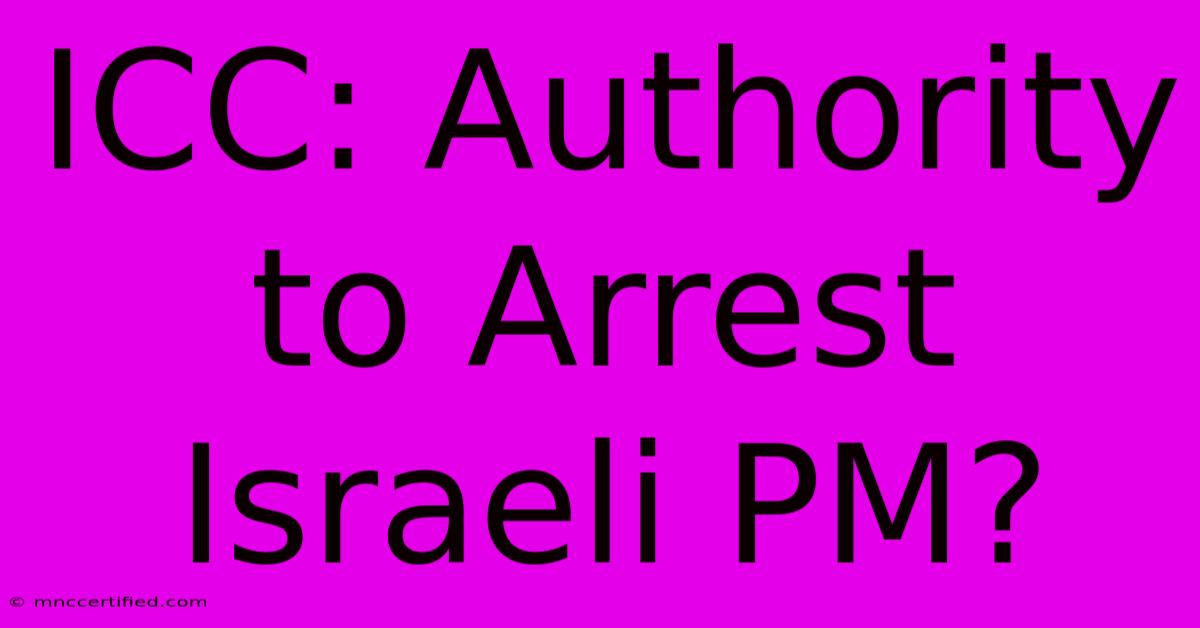ICC: Authority To Arrest Israeli PM?

Table of Contents
ICC: Authority to Arrest Israeli Prime Minister? A Deep Dive into International Law and Geopolitics
The International Criminal Court (ICC) and its potential to arrest Israeli Prime Minister Benjamin Netanyahu is a complex issue steeped in international law, geopolitical tensions, and deeply held beliefs. This article will explore the ICC's jurisdiction, the ongoing investigations, the legal arguments for and against arrest, and the broader geopolitical implications.
Understanding the ICC's Mandate
The ICC is an intergovernmental organization and international tribunal that sits in The Hague, Netherlands. Its primary purpose is to prosecute individuals accused of the most serious crimes of international concern: genocide, war crimes, crimes against humanity, and the crime of aggression. It's important to understand that the ICC's jurisdiction is not universal. A state must either be a party to the Rome Statute (the treaty establishing the ICC) or accept the Court's jurisdiction in a specific case.
Key Point: Israel is not a state party to the Rome Statute. This significantly impacts the ICC's ability to exercise jurisdiction over Israeli officials.
The ICC's Investigation into the Situation in Palestine
The ICC's involvement stems from its investigation into the "situation in Palestine". This investigation, initiated in 2018, focuses on alleged war crimes and crimes against humanity committed in the occupied Palestinian territories since June 13, 2014. The investigation examines actions by both Israeli forces and Palestinian armed groups.
What are the allegations against Israeli officials?
The ICC prosecutor's office is investigating allegations against Israeli officials, potentially including Prime Minister Netanyahu, related to Israeli military operations in the occupied Palestinian territories. Specific allegations haven't been publicly detailed in their entirety to protect ongoing investigations. However, potential charges could relate to:
- Settlement building: The construction of Israeli settlements in the West Bank, considered illegal under international law by many.
- Military operations: Allegations of excessive force and disproportionate use of force during military actions in Gaza and the West Bank.
- Treatment of Palestinian civilians: Concerns surrounding the treatment of Palestinian detainees and civilians.
The Legal Arguments: Can the ICC Arrest Netanyahu?
The ICC's ability to arrest Netanyahu, even if he's indicted, hinges on several factors:
- Jurisdiction: While Israel isn't a member of the Rome Statute, the ICC argues it has jurisdiction based on the principle of "territorial jurisdiction" – because the alleged crimes occurred within the occupied Palestinian territories. This is a highly contested point.
- Acceptance of jurisdiction: Palestine, despite not being a UN member state, declared its acceptance of the ICC's jurisdiction. However, Israel disputes this declaration and the court's authority.
- Principle of Complementarity: The ICC only intervenes if a state is unwilling or unable genuinely to investigate and prosecute crimes itself. Israel argues it has its own justice system capable of handling these matters.
- Political implications: The arrest of a sitting head of government would be unprecedented and would likely have severe geopolitical ramifications.
Geopolitical Implications and International Reactions
The potential arrest of Netanyahu is a highly sensitive issue with far-reaching geopolitical consequences. It could:
- Further escalate tensions: Already strained relations between Israel and Palestine, as well as Israel and many Western nations, could deteriorate significantly.
- Impact regional stability: The situation could destabilize the already volatile Middle East.
- Challenge the international legal order: The case tests the boundaries of the ICC's jurisdiction and its ability to operate effectively in a context of significant power imbalances.
Many countries support the ICC's investigation, while others, including the United States, strongly oppose it, citing concerns about bias and overreach.
Conclusion: An Uncertain Future
The question of whether the ICC has the authority to arrest the Israeli Prime Minister remains unresolved and highly contested. The legal arguments are complex, and the geopolitical implications are profound. The situation highlights the challenges and limitations of international law in addressing complex conflicts, particularly those involving powerful states. The ongoing investigation and any subsequent actions will undoubtedly shape the future of international criminal justice and the delicate balance of power in the Middle East for years to come. Further developments in the case will need close monitoring.
Keywords: ICC, International Criminal Court, Israel, Benjamin Netanyahu, Palestine, occupied Palestinian territories, war crimes, crimes against humanity, Rome Statute, international law, geopolitical implications, arrest warrant, investigation, jurisdiction, settlement building, military operations, international relations, Middle East conflict.

Thank you for visiting our website wich cover about ICC: Authority To Arrest Israeli PM?. We hope the information provided has been useful to you. Feel free to contact us if you have any questions or need further assistance. See you next time and dont miss to bookmark.
Featured Posts
-
Russias Missile Attack On Ukraine Confirmed
Nov 22, 2024
-
Coldplay Mumbai 2025 Ticket Sale Details
Nov 22, 2024
-
Predictive Modeling In Insurance
Nov 22, 2024
-
Ellen Portia Reportedly Leave Us
Nov 22, 2024
-
Maura Higgins I M A Celeb Silence Broken
Nov 22, 2024